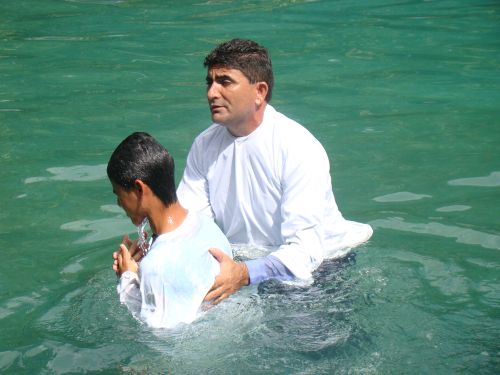 Water has an almost mystical significance in many religions worldwide. For Christians, baptism can represent a profound spiritual rebirth, a cleansing of sins, or an initiation into the faith. But Christianity isn't alone in its reverence for water-based rituals, and not all Christian baptisms are the same.
Water has an almost mystical significance in many religions worldwide. For Christians, baptism can represent a profound spiritual rebirth, a cleansing of sins, or an initiation into the faith. But Christianity isn't alone in its reverence for water-based rituals, and not all Christian baptisms are the same.
Consider how different religions use water as a powerful symbol of purification, conversion, and divine connection.
Catholicism
Baptism in the Catholic Church is a significant ceremony that symbolizes the washing away of original sin, a spiritual mark believed to be inherited from Adam and Eve. Baptism is one of the Church's seven essential sacraments and serves as a formal initiation into the Catholic community. While Catholic baptism is commonly performed on infants, adults who come to the faith can also be baptized.
Protestantism
Various Protestant denominations share the concept of baptism, but actual practices and beliefs can differ. Some traditions, such as Baptists and Evangelical Christians, emphasize believer's baptism, which only baptizes people who consciously decide to follow Christ. On the other hand, Lutherans and Anglicans maintain the practice of infant baptism.
Eastern Orthodoxy
Eastern Orthodox Christians view baptism as a fundamental sacrament, emphasizing the full immersion in water to represent a death to sin and a revival of a new life in Christ.
The Eastern Orthodox Church generally takes a compassionate view regarding the fate of unbaptized infants. While they recognize the concept of original sin and the importance of baptism, they tend to believe in God's infinite mercy and hope for the salvation of unbaptized infants. However, individual beliefs vary within the Orthodox tradition, as no universally agreed-upon doctrine exists.
Latter-day Saints (Mormons)
For followers of the Church of Jesus Christ of Latter-day Saints (colloquially known as "Mormons"), baptism is a significant ordinance essential for salvation. LDS members practice baptism by full immersion, which symbolizes the washing away of sins. Additionally, Mormon children cannot be baptized until they reach the age of accountability, which is typically around 8 years old.
Latter-day Saint doctrine teaches that baptism is not merely a cleansing ritual but also a covenant-making ceremony. When people are baptized, they are expected to make certain promises to God, including following the teachings of Jesus Christ, obeying the commandments, and striving to live a righteous life.
Christian Scientists
Christian Scientists hold a unique view on baptism. Rather than it being a physical act involving water, they see baptism as a mental and spiritual purification. To them, the inner transformation and growth in understanding God is more vital than an outward ritual.
Hinduism
The Hindu faith places significant importance on water as a purifying agent. Devotees take pilgrimages to holy rivers, especially the Ganges, seeking to cleanse themselves of sins. These ritual baths differ from Christian baptism in context but mirror its purifying intent.
Shintoism
In Shinto, Japan's indigenous religion, purification rituals called "Misogi" are performed. Participants immerse themselves in waterfalls, rivers, or the sea to cleanse themselves of impurities. This purification rite helps individuals maintain a harmonious relationship with the Kami, or divine spirits.
Sikhism
In the Sikh initiation ceremony called "Amrit Sanskar," initiates drink a mixture of sweetened water (Amrit). This act marks the individual's commitment to the teachings of Guru Granth Sahib (Sikh holy scripture) and the 10 Sikh Gurus. Though not a baptism in the Christian sense, it signifies spiritual rebirth and dedication to the path of Sikhism.
While baptism is specific to Christianity, the symbolism of water as a medium for purification and transformation is a universal motif. Water rituals are seen across many religions and cultures as a conduit to the divine, a way to cleanse the spirit, and a path to renewal.
Add Your Comment